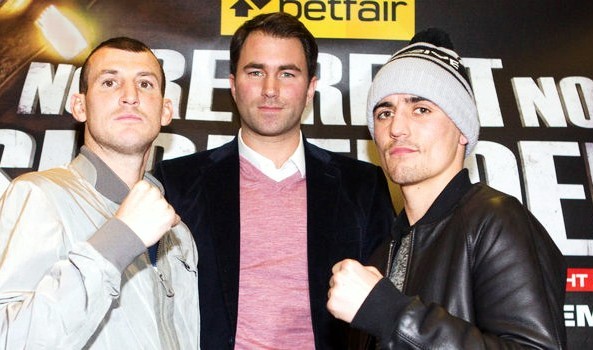(From left to right: Derry Mathews, promoter Eddie Hearn, Anthony Crolla)
Anthony Crolla makes his first competitive start this weekend since the night he almost killed Heywood rival Kieran Farrell. In a suffocating December brawl, the 22-year-old Farrell developed an acute subdural haematoma that threatened his life. He survived but not without consequence. Farrell lost almost a third of his brain, his career and a pitiless dream. The effect on Crolla has yet to be measured. Rarely, though, are the winners of such catastrophes able to proceed unaltered.
Former featherweight world champion Barry McGuigan confessed to pulling his punches against Jimmy Duncan after previous foe Young Ali (Asymin Mustapha) fell into a coma and later died in 1982. A tormented Chris Eubank was similarly affected against Thulani Malinga after Michael Watson only narrowly evaded death in their titanic rematch. Junior lightweight world titlist Gabriel Ruelas claimed to have been haunted by the ghost of Jimmy Garcia when he re-entered the fray against Azumah Nelson. Ruelas had dealt the 23-year old Colombian Garcia a prolonged beating seven months prior from which he would never recover. The boxers that left the ring under their own volition were subsequently crippled with guilt and regret. It is a familiar story.
In 1994, Liverpool’s Richie Wenton turned his back on Neil Swain in the middle of an exchange, spat out his mouthpiece and wept — so tortured was he over his involvement in the death of Londoner Bradley Stone. “Every second of every minute of every round, I was thinking about Bradley,” he said afterwards. There have been countless more examples. Mbulelo Botile didn’t win another fight after injuring Paul Ingle. Ray “Boom Boom” Mancini was never the same boxer after the death of Duk Koo Kim. Emile Griffith after Benny Paret. Ezzard Charles after Sam Baroudi. Training to deliver unyielding punishment upon an opponent without ever intending to hurt them became a mystifying paradox too pronounced to ignore.
To compound the psychological quandary that confronts Crolla, the man that opposes him at Liverpool’s Echo Arena is Derry Mathews, who stopped the New Moston man on his feet in Britain’s most torrid encounter of last year. The pair will contest the vacant Commonwealth title at lightweight Saturday. Both are former British champions.
Crolla, 25-4 (9), is a consummate technician from the Joe Gallagher gym in Bolton. Small at the weight, an absence of both head movement and concussive power renders his pressure-fighting style less potent than its design and so he must whittle opponents down systematically in order to beat them.
Mathews, 32-8-1 (17), is a wiry, broad-shouldered scrapper for whom the term erratic could well have been coined. Solid beginnings that took in triumphs over John Simpson and Stephen Foster, Jr. were marred by losses to Choi Tseveenpurev, Martin Lindsay, Harry Ramogoadi and Scott Lawton. After a brief retirement, “Dirty” Derry gained revenge over Choi and Lawton only to fall apart physically against Welsh whirlwinds Gary Buckland and Gavin Rees.
After suffering a career-threatening nose fracture against Rees, Mathews looked for all the world like a shot fighter when he was beaten up in front of his home fans by prohibitive underdog Emiliano Marsili. The blithe Scouser — blood-splattered and on paper legs — appeared finished, but then came his startling resurrection against Crolla.
Crolla had controlled the opening round behind a piston-like jab and steady forward rumble. Once Mathews managed to get going with his left hand' though, he began to feel his way into set-tos where his advantages in both strength and power were able to disturb Crolla’s momentum. As the pair warmed into a blistering quarrel in round 3, Mathews kidded Crolla onto a pair of whistling right uppercuts that dumped him hard onto his backside. A dogfight then ensued, up until Mathews popped his man with a scything counter left hook in round 6 that prompted a somewhat antsy John Keane to jump the gun and call time.
The duo had been tipped to cross paths again in a Prizefighter tournament back in October. Despite a stoppage loss to Gavin Rees, Mathews had been favoured heading in but was he soon thwarted in the second round of matches after being sliced over both eyes in his opening bout. Crolla meanwhile was outhustled by current English junior lightweight champion Gary Sykes who ambushed him with scruffy attacks and drew him away from the textbook boxing at which he excels. Crolla has since absorbed the gruelling match with Farrell, whereas Mathews has tallied a one round blowout over Bulgarian Asan Yuseinov.
Oddsmakers have found it difficult to split them, with both men hovering either side of even money (Crolla, three years the younger man at 26, remains the slight favourite). It is difficult to imagine Crolla outbrawling Mathews or being permitted to score points on the back foot and so, if he can avoid the facial damage that has blighted his career, the outsider should be able to claim a repeat victory over the popular Mancunian amid rabid home support. Crolla will need to box a well-ordered, risk-averse fight and aim to wear Mathews out physically in order to overturn the only stoppage loss on his ledger. Perhaps in that regard, any reluctance to engage as a result of events before Christmas could prove to be a blessing in disguise. One suspects that Kieran Farrell will not be far from his mind.
British light heavyweight champion Tony “Bomber” Bellew, 19-1 (12), headlines the bill against Malawian Isaac Chilemba, 20-1-1 (9), while Merseyside prospects James “Jazza” Dickens, Rocky Fielding, Callum Smith and Tom Stalker, also feature, alongside Birmingham starlet Khalid Yafai.

